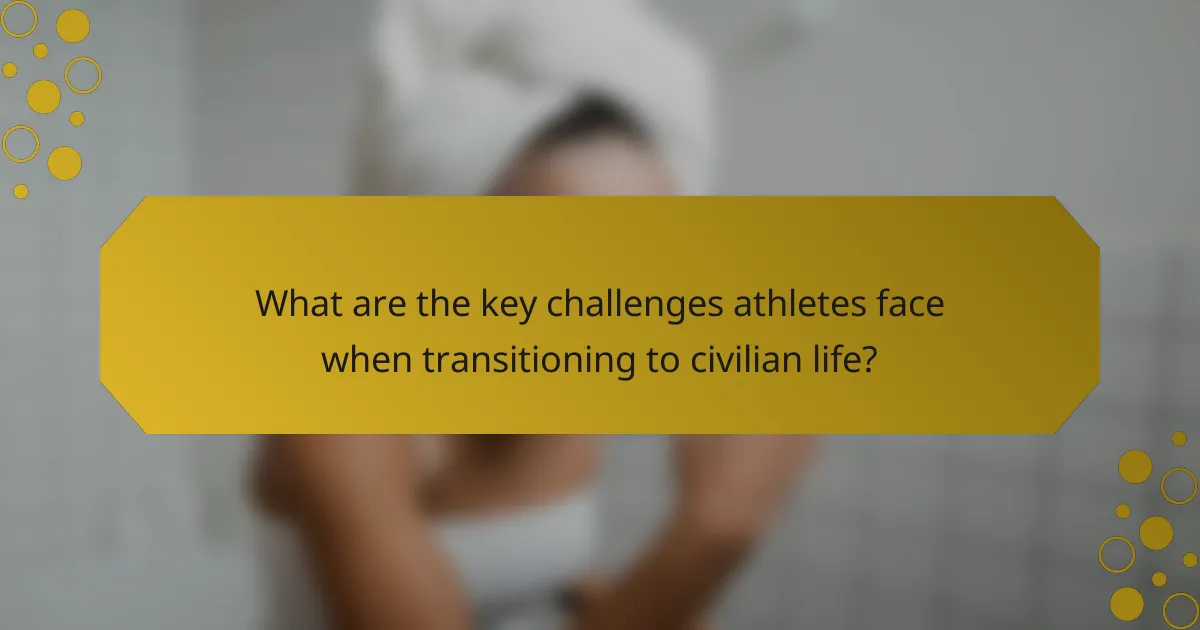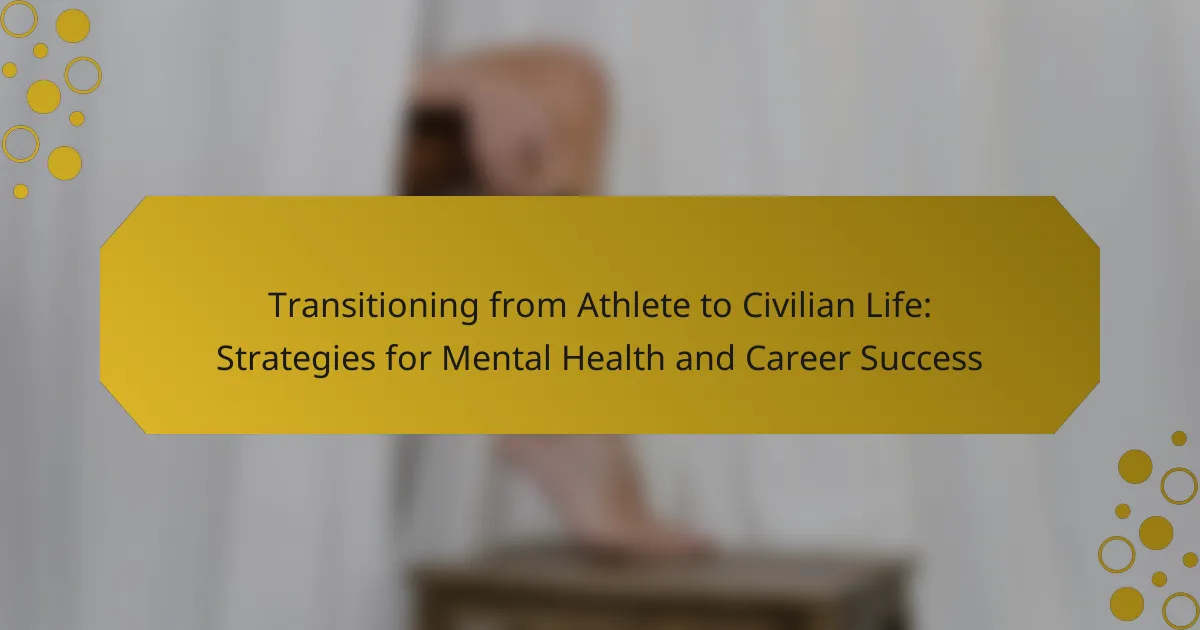Transitioning from athlete to civilian life presents unique challenges, including identity loss and mental health issues. Establishing a routine and seeking professional support can enhance well-being. Developing a personal brand and networking can lead to career success. Mindfulness practices and community engagement further support a smooth transition and fulfillment in new roles.

What are the key challenges athletes face when transitioning to civilian life?
Athletes face significant challenges transitioning to civilian life, including identity loss, mental health issues, and career uncertainty. The abrupt shift from a structured, competitive environment can lead to feelings of isolation and lack of purpose. Mental health struggles, such as anxiety and depression, are common due to the pressure to succeed in a new career. Additionally, athletes may find it difficult to translate their skills into civilian job markets, creating uncertainty about their future. Building a support network and seeking professional guidance can help address these challenges effectively.
How does identity shift impact mental health after sports?
Identity shift significantly impacts mental health after sports by creating feelings of loss and disconnection. Athletes often struggle with their self-identity post-career, leading to anxiety and depression. Strategies to mitigate these effects include seeking professional counseling, engaging in new hobbies, and building a supportive community. Transitioning can be smoother with proactive career planning, allowing athletes to redefine their identity and find fulfillment outside of sports.
What role does social support play during this transition?
Social support plays a crucial role in easing the transition from athlete to civilian life. It provides emotional stability, enhances coping mechanisms, and fosters a sense of belonging. Research indicates that strong social networks can significantly reduce stress and anxiety during this period. Engaging with family, friends, and peers offers encouragement and practical assistance, which is vital for mental health. Additionally, support groups tailored for former athletes can facilitate shared experiences and resources, aiding in career success and personal adjustment.
Which relationships are most crucial for emotional well-being?
Strong relationships with family, friends, and mentors are crucial for emotional well-being during the transition from athlete to civilian life. These connections provide support, encouragement, and guidance. Family relationships often offer unconditional love, while friendships can foster a sense of belonging. Mentors can provide valuable insights into career paths and personal development. Engaging in these relationships can enhance resilience and promote mental health.
What are common mental health issues faced by retired athletes?
Retired athletes commonly face mental health issues such as depression, anxiety, and identity crisis. These challenges arise from the abrupt transition from a competitive sports environment to civilian life. Depression can manifest due to loss of purpose and routine, while anxiety may stem from uncertainty about future careers. Identity crisis often occurs as athletes struggle to redefine themselves outside of their sports roles. Studies indicate that around 30% of retired athletes experience significant mental health issues, highlighting the need for targeted support and resources during this transition.
How can anxiety and depression manifest post-career?
Anxiety and depression can manifest post-career through feelings of loss, identity crisis, and increased isolation. Athletes often struggle with the abrupt transition from a structured environment to civilian life, which can exacerbate mental health issues. Emotional challenges may include a sense of purposelessness and difficulty in establishing new social connections. Research indicates that 35% of retired athletes report experiencing anxiety and depression, underscoring the need for support systems during this transition. Engaging in therapy, building new routines, and fostering community connections are effective strategies to mitigate these mental health challenges.

What universal strategies can support mental health in this transition?
Developing a routine, seeking professional support, and engaging in community activities can significantly enhance mental health during the transition from athlete to civilian life. Establishing a daily structure helps maintain focus and purpose. Professional counseling provides essential coping strategies for managing stress and anxiety. Participating in community events fosters social connections, reducing feelings of isolation. These strategies support emotional well-being and facilitate a smoother transition.
How can athletes develop new career goals?
Athletes can develop new career goals by leveraging their skills and experiences. They should assess their interests, network with professionals, and seek mentorship. Setting specific, measurable, achievable, relevant, and time-bound (SMART) goals enhances focus and direction. Engaging in professional development opportunities can also provide clarity and new pathways.
What steps are involved in identifying transferable skills?
Identifying transferable skills involves a systematic approach. First, reflect on your athletic experiences to pinpoint skills like teamwork and discipline. Next, analyze job descriptions to match these skills with civilian roles. Then, seek feedback from peers or mentors to gain insights into your strengths. Finally, document and practice articulating these skills in various contexts, preparing for interviews and networking opportunities.
What resources are available for career planning?
Various resources support career planning for athletes transitioning to civilian life. Professional organizations offer mentorship programs tailored to athletes. Workshops and seminars focus on skill translation and resume building. Online platforms provide access to job boards specific to athletic backgrounds. Networking events connect former athletes with potential employers. Mental health services help address emotional challenges during this transition. These resources collectively enhance career success and mental well-being.
Which organizations provide support for retired athletes?
Several organizations provide support for retired athletes, focusing on their mental health and career transitions. Notable examples include the Professional Athletes Foundation, which offers financial assistance and career counseling, and the NFL Players Association, which provides resources for mental health and job placement. The Women’s Sports Foundation supports female athletes in career development and wellness initiatives. Additionally, the Athletes for Hope organization connects retired athletes with community service opportunities, enhancing their post-sports identity. These organizations play a crucial role in facilitating successful transitions for retired athletes.

What unique strategies can enhance post-career success?
Developing a unique personal brand enhances post-career success for athletes. Focus on storytelling to convey experiences, skills, and values. Networking is crucial; leverage connections made during your athletic career to explore new opportunities. Emphasizing mental health through counseling or support groups fosters resilience during transition. Continuous learning, such as pursuing further education or certifications, strengthens career prospects.
How can networking influence career opportunities?
Networking significantly enhances career opportunities by connecting individuals to industry professionals and potential employers. Building relationships can lead to mentorship, job referrals, and insider information about job openings. Engaging in networking activities, such as attending industry events or joining professional organizations, fosters valuable connections. A unique attribute of effective networking is the ability to leverage shared experiences, which can create a sense of trust and collaboration. As a result, athletes transitioning to civilian life can benefit from these networks to navigate their new career paths successfully.
What are effective networking techniques for athletes?
Effective networking techniques for athletes include leveraging existing relationships, attending industry events, and utilizing social media platforms. Building connections with fellow athletes, coaches, and mentors can provide valuable insights and opportunities. Engaging in workshops and conferences allows athletes to meet professionals in their desired fields. Additionally, maintaining an active presence on platforms like LinkedIn can help athletes showcase their skills and connect with potential employers.
What role does mentorship play in career transitions?
Mentorship is crucial during career transitions, offering guidance, support, and networking opportunities. Experienced mentors help athletes navigate challenges, develop new skills, and set achievable goals. This relationship fosters confidence and resilience, essential for adapting to civilian life. Studies show that mentored individuals often report higher job satisfaction and improved mental health, highlighting mentorship’s unique role in successful transitions.
How can former athletes find mentors in new fields?
Former athletes can find mentors in new fields by leveraging their existing networks and seeking out professionals with shared interests. Engaging in industry-specific events, workshops, and online platforms can facilitate connections. Additionally, platforms like LinkedIn allow athletes to reach out directly to potential mentors, enhancing their transition into civilian life. Networking through alumni associations or sports organizations can also provide valuable introductions.

What rare but impactful practices can improve mental health and career success?
Engaging in mindfulness practices and networking can significantly enhance mental health and career success for athletes transitioning to civilian life. Mindfulness reduces stress and improves focus, while networking opens doors to opportunities and support systems.
Unique strategies include volunteering in community programs, which fosters a sense of purpose and connection. Additionally, seeking mentorship from experienced professionals can provide guidance and insight into new career paths.
Research shows that these practices not only improve emotional well-being but also increase job satisfaction and performance. Athletes who adopt these strategies often report smoother transitions and greater fulfillment in their new roles.
How can creative outlets contribute to emotional well-being?
Creative outlets significantly enhance emotional well-being by providing a means for self-expression and stress relief. Engaging in activities such as painting, writing, or music can foster a sense of accomplishment and purpose. Studies show that creative expression reduces anxiety and depression, promoting mental clarity and emotional resilience. Furthermore, these outlets can facilitate social connections, offering support networks that are crucial during transitions, such as moving from athletic careers to civilian life.
What innovative approaches are being used in athlete transition programs?
Innovative approaches in athlete transition programs focus on holistic support, including mental health resources and career coaching. Programs now incorporate peer mentoring, personalized transition plans, and workshops on life skills. These strategies aim to enhance resilience and adaptability in civilian life. As a result, athletes report improved mental well-being and career satisfaction.

What best practices should athletes follow for a successful transition?
Athletes should prioritize mental health, establish a support network, and develop new skills for a successful transition. Focus on self-care practices, such as mindfulness and therapy, to manage stress. Building relationships with peers and mentors can provide guidance and encouragement. Investing in education or vocational training enhances employability and facilitates career changes. Engage in networking opportunities to connect with potential employers or industry professionals.
What common mistakes should be avoided during this process?
Avoiding common mistakes during the transition from athlete to civilian life is crucial for mental health and career success. Key pitfalls include neglecting emotional support, underestimating the adjustment period, failing to set realistic goals, and not leveraging transferable skills. Many athletes struggle with identity loss; seeking professional help can mitigate this challenge. Additionally, maintaining a structured routine and engaging in networking activities can enhance the transition experience.
How can athletes maintain a positive mindset throughout the transition?
Athletes can maintain a positive mindset during transition by embracing change, seeking support, and setting new goals. Acknowledging feelings of uncertainty is essential for mental health. Building a network of peers and mentors fosters resilience. Engaging in activities that promote well-being, such as mindfulness and physical exercise, enhances emotional stability. Regularly reassessing personal and professional aspirations helps maintain focus and motivation.
What daily habits support mental health post-career?
Daily habits that support mental health post-career include establishing a routine, engaging in physical activity, and practicing mindfulness. These habits foster stability and reduce stress. Regular exercise enhances mood and cognitive function, while mindfulness techniques improve emotional regulation. Additionally, maintaining social connections and pursuing hobbies can provide a sense of purpose and fulfillment.
